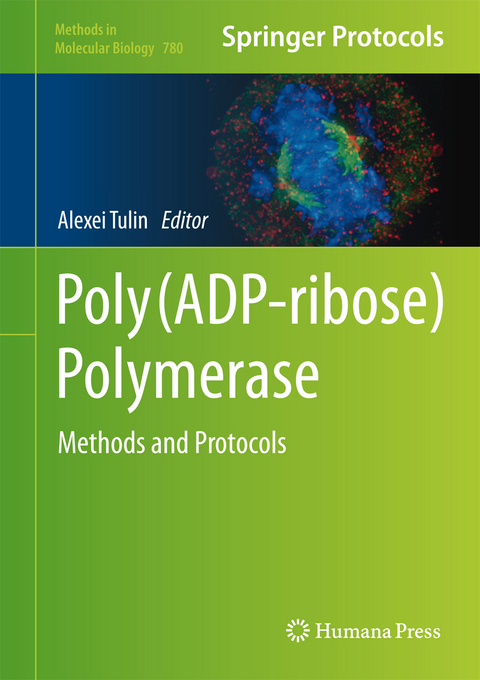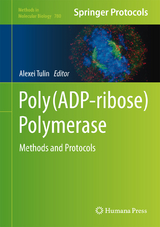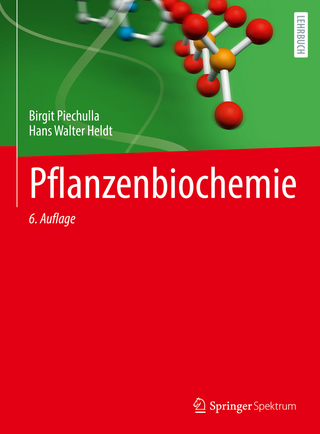Poly(ADP-ribose) Polymerase
Humana Press Inc. (Verlag)
978-1-61779-269-4 (ISBN)
Poly (ADP-ribose) Polymerases (PARPs) are abundant and ubiquitous proteins that regulate crucial processes of the cell cycle, DNA repair, genomic stability, and transcriptional regulation. Being involved in basic cell functions, PARPs mediate rapid responses to such environmental factors as stress, infection, nutrition and hormonal signals. Whereas PARP inhibitors can suppress tumor growth and proliferation in certain breast, ovarian, and prostate cancers, understanding how PARP controls cellular functions is essential for the development of novel cancer treatments strategies. Divided into three convenient sections, Poly(ADP-Ribose) Polymerase: Methods and Protocols aims to explain how PARP proteins act within the normal development of an organism as well as in pathogenic conditions, seeks to advance the knowledge of developmental pathways regulation, and endeavors to facilitate the development of new therapeutic drugs and methods to target PARP-dependent processes. Written in the highly successful Methods in Molecular Biology™ series format, chapters contain introductions to their respective topics, lists of the necessary materials and reagents, step-by-step, readily reproducible laboratory protocols, and notes on troubleshooting and avoiding known pitfalls.
Authoritative and accessible, Poly(ADP-Ribose) Polymerase: Methods and Protocols serves as an ideal guide to scientists who wish to continue exploring this exciting and progressive research field.
Approaches to Detect PARP-1 Activation In vivo, In situ, and In vitro.- Quantification of Poly(ADP-ribose) In vitro: Determination of the (ADP-ribose) Chain Length and Branching Pattern.- Assay for Protein Modification by Poly-ADP-Ribose In vitro.- Identification of Distinct Amino Acids as ADP-ribose Acceptor Sites by Mass Spectrometry.- Non-covalent Protein Interaction with Poly(ADP-ribose).- Non-covalent pADPr Interaction with Protein and Competition with RNA for Binding to Proteins.- Affinity-based Assays for the Identification and Quantitative Evaluation of Non-covalent Poly(ADP-ribose)-binding Proteins.- Detecting and Quantifying pADPr In vivo.- Purification of Recombinant Poly(ADP-ribose) Polymerases.- Methods for Purification of Proteins Associated with Cellular poly(ADP-risbose) and PARP-specific Poly(ADP-ribose).- Purification and Characterization of Poly(ADP-ribosyl)ated DNA Replication/Repair Complexes.- PARP1 Genomics: Chromatin Immuno-precipitation Approach using Anti-PARP1 Antibody (ChIP and ChIP-seq).- Purification of Human PARP-1 and PARP-1 Domains from E. coli for Structural and Biochemical Analysis.- Regulation of Chromatin Structure by PARP-1.- The Use of PARP Inhibitors in Cancer Therapy: Use as Adjuvant with Chemotherapy or Radiotherapy, Use as a Single Agent in Susceptible Patients; Techniques used to Identify Susceptible Agents.- Quantification of PARP Activity in Human Tissues: Ex vivo Assays in Blood Cells, and Immunohistochemistry in Human Biopsies.- Assay for Hypermethilation of the BRCA1 Gene Promoter in Tumor Cells to Predict Sensitivity to PARP-Inhibitor Therapy.- Generation of Poly(ADP-ribosyl)ation Deficient Mutants of the Transcription Factor, CTCF.- Phenotypic Characterization of Parp-1 and Parp-2 Deficient Mice and Cells.- Poly(ADP-ribosyl)ation Pathways in Mammals: The Advantage of Murine PARG Null Mutation.- Genetic Approaches to Targeting Multiple PARP Genes in a Mammalian Genome.- Approaches to Separate and Identify Poly(ADP-ribosyl)ated Proteins using PARG Knockout Drosophila.- Immuno-localization of poly-ADP-Ribose on Drosophila Polytene Chromosomes.- The Immuno-detection of pADPr in Drosophila Tissues: Immunostaining of Thick Sections; Immuno-EM.- Poly(ADP-ribose) Metabolism Analysis in the Nematode Caenorhabditis elegans.- Genetic Dissection of PARylation in the Filamentous Fungus Neurospora crassa.- Purification of the Poly-ADP-ribose Polymerase – like Thermozyme from the Archaeon Sulfolobus Solfataricus.- Strategies Employed for the Development of PARP Inhibitors.- Small-molecule Collection and High-throughput Colorimetic Assay to Identify PARP-1 Inhibitors.
| Reihe/Serie | Methods in Molecular Biology ; 780 |
|---|---|
| Zusatzinfo | XV, 521 p. |
| Verlagsort | Totowa, NJ |
| Sprache | englisch |
| Maße | 178 x 254 mm |
| Themenwelt | Naturwissenschaften ► Biologie ► Biochemie |
| Naturwissenschaften ► Biologie ► Mikrobiologie / Immunologie | |
| Naturwissenschaften ► Biologie ► Zellbiologie | |
| ISBN-10 | 1-61779-269-1 / 1617792691 |
| ISBN-13 | 978-1-61779-269-4 / 9781617792694 |
| Zustand | Neuware |
| Haben Sie eine Frage zum Produkt? |
aus dem Bereich




